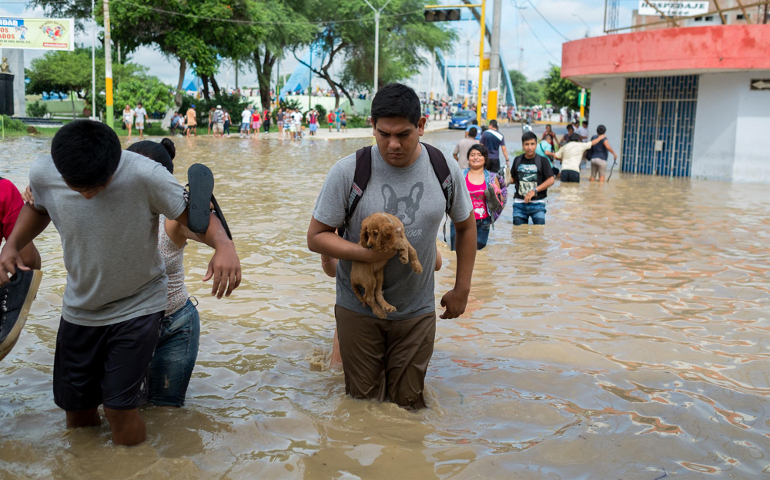
People cross a street flooded by the Piura River on March 27 in Peru. (CNS photo / EPA / Edwin Zapata Alvarado)
Peru's most destructive flooding in two decades has destroyed more than 800 villages as the warming of Pacific waters led to torrential downpours that burst riverbanks March 15-17. The rainfall, which meteorologists have attributed to the phenomenon El Niño, is expected to continue throughout April.
Landslides and flooding have affected 24 of the country's 25 regions, and 13 regions have declared a state of emergency. And throughout those regions, where 700,000 have been left homeless, the Sisters of Bon Secours can be found trucking along in their mobile clinics.
Bon Secours Health System, a nonprofit Catholic health system founded by the Sisters of Bon Secours, flew more than 3,500 pounds of medicine into the country within two weeks of the initial flooding, said Camille Grippon, director of ecology and global ministries for Bon Secours Health System. The group, in partnership with the disaster relief agency Americares, were among the first organizations to provide an international response to the scene.
The day after the flooding began, sisters took their ambulances to the populous regions of Piura, Ancash, and La Libertad, where residents are afflicted with waterborne illnesses and homelessness. Those most affected were already economically disadvantaged, their homes constructed on cheap land along the river.
"In Trujillo [the capital of La Libertad], a lot of the places by the river are either flat and sandy or mountainous, with shantytowns, adobe houses, straw houses, or — if they're doing better—concrete houses, but this flooding took everything in its path," said Grippon, who is in charge of the international initiatives in health care delivery, emergency relief, and public health programs in developing countries, and was recently in Peru alongside the sisters.
About 40 Bon Secours sisters from Peru are on the ground providing health care, Grippon said. While the sisters had previous experience in medical campaigns, being thrown into emergency situations requiring them to "think on their feet and troubleshoot" was a new experience for them.
"We visited communities that had 2,000 homes and now have nothing, except a makeshift shelter where people are living," Grippon said. "It's frustrating and sad to see people living by their former structures waiting for help. The only thing they have is the land. Even though they're squatters and they've taken the land illegally, the only thing they know is to stay in that piece of land. Not only did they lose the structure, but if they start walking to get health care or get provisions, they fear that their land is also going to be taken away."


